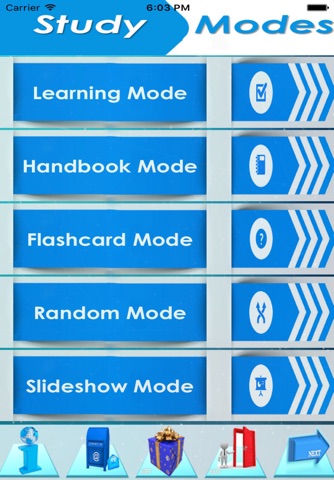
Cognitive Behavioral Therapy (CBT): Your Mind Over Your Mood (+2000 study notes & quiz)
Cognitive Behavioural Therapy (CBT): Your Mind Over Your Mood.
Cognitive behavioral therapy (CBT) is a form of psychotherapy. It was originally designed to treat depression, but is now used for a number of mental disorders
This app is a combination of sets, containing practice questions, study notes, terms & concepts for self learning & exam preparation on the topic of Anxiety Cognitive behavioral therapy (CBT).
With this app you can learn on the Go, Anytime & Everywhere. The learning & understanding process never been so easy like with our 5 study modes embedded in this app.
Our Learners get the best, thats why they dont just meet standards, They exceed them.
Get +2000 Study notes, exam quizzes, terms & definitions and Prepare & Pass Your Psychology Exam easily to guarantee the highest score.
CBT is effective for a variety of conditions, including mood, anxiety, personality, eating, addiction, dependence, tic, and psychotic disorders. Many CBT treatment programs have been evaluated for symptom-based diagnoses and been favored over approaches such as psychodynamic treatments. However, other researchers have questioned the validity of such claims to superiority over other treatments.
By the end of this app we expect that you expand your knowledge, widen your expertise, improve your practical skills and Broaden your academic & career horizons.
We promise that this app will strengthen your self-confidence during the exam & daily work.
Remember that you should get the Skills you need to land the job you want.
Learn & educate your self as much as you can, knowledge is the real and best capital & assets that you own.
Invest in your Success Now. Your investment in knowledge, professionalism & expertise is durable & with a High value added. Its a High return investment.
In this application you will get over 20 Exam sets.
-This application is downloaded and used by graduate & undergraduate students, teachers, lecturers, professionals, PhD, researchers, reviewers not only in the US but also in Philippines, Canada, India, Australia, Turkey, Russia, UK, GCC, India, Saudi Arabia, Nigeria, and all over the world.
Main Features:
- +2000 exam questions and study notes
- 5 study modes
- Shareable content
- Settings: with flexibility to change font size & background control.
Mainstream cognitive behavioral therapy assumes that changing maladaptive thinking leads to change in affect and behavior,[9] but recent variants emphasize changes in ones relationship to maladaptive thinking rather than changes in thinking itself. The goal of Cognitive Behavioral Therapy is not to diagnose a person with a particular disease, but to look at them as a whole and decide what needs to be fixed. The basic steps in a Cognitive-Behavioral Assessment include
Step 1: Identify critical behaviors
Step 2: Determine whether critical behaviors are excesses or deficits
Step 3: Evaluate critical behaviors for frequency, duration, or intensity (obtain a baseline)
Step 4: If excess, attempt to decrease frequency, duration, or intensity of behaviors; if deficits, attempt to increase behaviors.
CBT has six phases:
Assessment or psychological assessment;
Reconceptualization;
Skills acquisition;
Skills consolidation and application training;
Generalization and maintenance;
Post-treatment assessment follow-up.
The reconceptualization phase makes up much of the "cognitive" portion of CBT. A summary of modern CBT approaches is given by Hofmann.
There are different protocols for delivering cognitive behavioral therapy, with important similarities among them. Use of the term CBT may refer to different interventions, including "self-instructions (e.g. distraction, imagery, motivational self-talk), relaxation and/or biofeedback, development of adaptive coping strategies (e.g. minimizing negative or self-defeating thoughts), changing maladaptive beliefs about pain, and goal setting".



